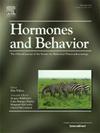寄养期间兄弟姐妹的存在以性别特异性方式改善社会性啮齿动物(Octodon degus)的内分泌应激谱变化
IF 2.5
3区 医学
Q2 BEHAVIORAL SCIENCES
引用次数: 0
摘要
在生命早期,亲子关系的中断会对后代生理和行为的发展产生重大影响。在啮齿类动物中,父母分离、父母照料减少和异地寄养都会影响内分泌应激反应的发育,这一点已得到充分证实。然而,对于社会性物种来说,一些社会因素可能会减轻异地寄养的压力,例如与其他已知的成年照顾者或兄弟姐妹在一起。在这项研究中,我们在出生后第8天(PND)将一种社会性啮齿动物(Octodon degus)与或不与它们的兄弟姐妹进行了交叉寄养,并测量了它们在寄养后(PND9)和断奶时(PND28)的内分泌应激反应。我们发现,单独寄养的雌性后代在寄养后立即表现出基线皮质醇水平升高和体重增加减少。断奶时,与未寄养的雌性后代相比,单一寄养的雌性后代基线皮质醇水平继续升高,而与未寄养或与兄弟姐妹一起寄养的雄性后代相比,单一寄养的雄性后代皮质醇负反馈强度较弱。这些结果表明,兄弟姐妹的存在可能有助于减轻寄养带来的压力,未来的研究应进一步探讨其他社会条件,这些条件可能有助于减轻父母长期关系中断对儿童发育造成的影响。本文章由计算机程序翻译,如有差异,请以英文原文为准。
Sibling presence during fostering ameliorates endocrine stress profile changes in a social rodent species (Octodon degus) in a sex-specific manner
During early life, disruption of the parent-offspring bond can substantially impact development of offspring physiology and behavior. In rodents, it has been well-documented that parental separation, reduction in parental care, and cross-fostering can affect development of the endocrine stress response. For social species, however, several social factors may mitigate the stress of cross-fostering, such as remaining with other known adult caregivers or siblings. In this study, we cross-fostered a social rodent species (Octodon degus) with or without their siblings at postnatal day (PND) 8 and measured their endocrine stress response immediately after fostering (PND9) and at weaning (PND28). We found that female singly-fostered offspring displayed elevated baseline cortisol levels and reduced weight gain immediately after fostering. At weaning, female singly-fostered offspring continued to display elevated baseline cortisol levels compared to non-fostered female offspring, while singly-fostered males demonstrated weaker cortisol negative feedback strength compared to male offspring that were not fostered or were fostered with their siblings. These results suggest that sibling presence may help mitigate the stress of fostering, and that future studies should further examine other social conditions that may help reduce developmental consequences of long-term parental bond disruption.
求助全文
通过发布文献求助,成功后即可免费获取论文全文。
去求助
来源期刊

Hormones and Behavior
医学-行为科学
CiteScore
6.70
自引率
8.60%
发文量
139
审稿时长
91 days
期刊介绍:
Hormones and Behavior publishes original research articles, reviews and special issues concerning hormone-brain-behavior relationships, broadly defined. The journal''s scope ranges from laboratory and field studies concerning neuroendocrine as well as endocrine mechanisms controlling the development or adult expression of behavior to studies concerning the environmental control and evolutionary significance of hormone-behavior relationships. The journal welcomes studies conducted on species ranging from invertebrates to mammals, including humans.
 求助内容:
求助内容: 应助结果提醒方式:
应助结果提醒方式:


